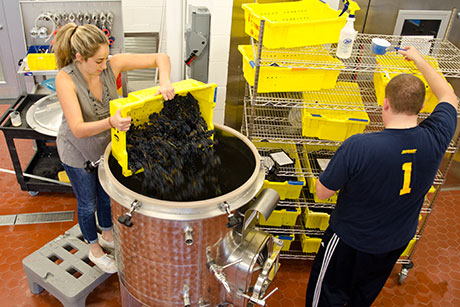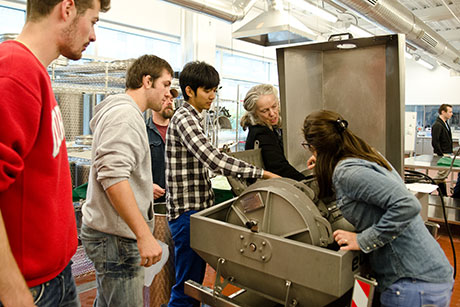New student winery transforms enology instruction
By Alex Koeberle


From harvesting grapes in the field to bottling finished wines for testing, Cornell’s recently expanded student winery is preparing students for the future of the wine industry.
Opened in July 2013, the student winery is part of the $105 million renovation and expansion of Stocking Hall. The 3,900-square-foot facility features small-scale tools designed to let students experiment with winemaking options, analytical methods and winery processes. Students and faculty in the viticulture and enology major, created in 2008, say it also represents a significant upgrade from the program’s previous location at the Cornell Orchards.
“I really enjoy the professional atmosphere,” says Kayla Winter ’15. “Because we have all these tools at our disposal, we as students take more pride in our work and utilize everything we can to produce quality wine in our labs.”
What sets the facility apart is its ability to let students to produce smaller lot sizes. This allows undergraduate students and faculty more freedom to experiment with winemaking techniques. With smaller lot sizes, students can produce more varieties with different outcomes.
“We want students to see the technology and processes of the wine industry, but at a smaller scale,” said enology lecturer Dwayne Bershaw. “Smaller-scale equipment means innovation and experimentation.”
Each piece of equipment is a scaled-down version of gear used by commercial wineries. This provides students with practical instruction applicable to the wine industry and beyond. In addition to two grape presses (100- and 300-liter capacities), the new facilities also showcase a destemmer-crusher, 64 jacketed 15-gallon stainless steel tanks and a 50-liter still to produce sparkling wines and beers.
According to Gavin Sacks, associate professor of food science whose research focuses on viticulture and enology, the student winery’s high-quality processing equipment allows for more variables when teaching winemaking, and gives students added tools to reinforce concepts learned in the classroom.
For example, finished wines need cold-stabilization before bottling to prevent potassium bitartrate sediments from forming. With the winery’s new tartrate stability/conductivity analyzer, students can measure and observe the process of tartrate precipitation. Sacks describes this as a “three-part system” for viticulture and enology education: classroom, in-winery and analytical support.
“It is critical to go from the classroom where students go over tartrate, to the winery where they can actually see potassium bitartrate crystals forming,” Sacks said. “Then to the analytical support space where students can evaluate and see pictorially or graphically whether or not a wine is stable.”
Viticulture and enology students also take advantage of the robust local wine industry, exploring regional challenges including the cool climate, unique grape varieties, soil conditions and economics. The new winery helps integrate students with industry by using locally grown grapes, and interacting with area grape growers and winemakers.
More than half of viticulture and enology major students enter the wine industry as winemakers or grape growers. The others often enter the workforce in a diverse range of agricultural sciences, or continue on to graduate school in related science fields or beyond.
Alex Koeberle ’13 is a freelance writer for the College of Agriculture and Life Sciences. A version of this article appeared in the March Issue of Appellation Cornell, News from Cornell’s Viticulture and Enology Program.
Media Contact
Get Cornell news delivered right to your inbox.
Subscribe